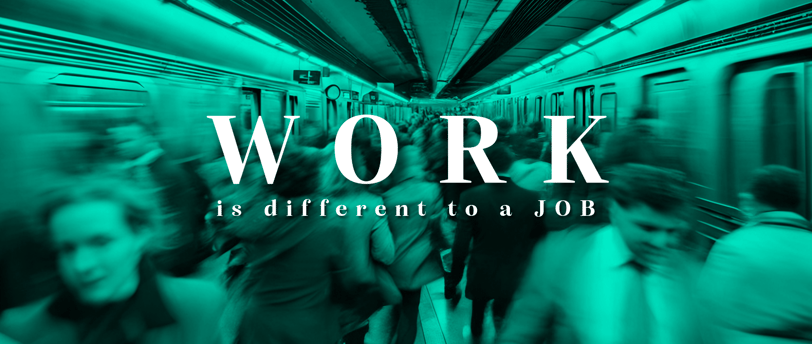W O R K. What is it?
Today, there are many conversations surrounding how much one should work. Some say 70 hours, some say 90 hours, and everywhere in between and above. I would like to understand this equation differently. To look into what work is and how we perceive it.
3/11/20255 min read


What is work?
Let’s start with a definition. Work is defined as an activity involving mental or physical effort done in order to achieve a purpose or result. This definition has a wide range of applications. In a more generalist sense, breathing is also a form of work, as it is a set of bio-mechanical processes done to keep us alive. When one of the involved components ceases to work, we die. These interpretations of work are involuntary and beyond the scope of this discussion. Let’s look at voluntary expressions of work.
Work is Essential to Life
The voluntary expression of work is the more interesting aspect of humans. We are sentient beings who can choose where to direct this energy. Before we continue, it is necessary to establish the axiom: All living beings must work. Work is an inescapable aspect of life.
All beings are required to work, exerting their bodies to a productive end. This could be in different ways: working to seek food for nourishment, performing to attract a mate for procreation, getting away from a dangerous situation for self-preservation, and so on. These are some manifestations of work. Animals and plants exhibit this behavior, and humans do, too, in many different ways.
One of life's fundamental actions is gathering energy from the world and transforming it into productive actions to sustain a competitive reality—transforming energy from a lower form to a higher one that benefits the being. The better the quality of transformation, the better the chances of thriving.
These are good enough points to validate this axiom.
Work in Today’s Context
Today, work is heavily tied to economic gain. The modern definition of work includes economic value as the end product of work. However, work pre-dates money. Work, as seen, is an essential biological activity, whereas money is a relatively newer concept. It is safe to assume that the end of work has not always been money.
The work-money co-relation today is distorted. Mainly because we miss the connection between them, it should be work-job-money. Work is the exertion of the physical body to achieve a purpose or result, and a job is the type of work you do to make money. This blurring of the middle piece, the job, creates this distortion. There are a lot of factors that inhibit the recognition of this connector. Economic activity has become so important that a person’s capacity for work is spent almost entirely at their job. This is a societal factor. However, what I am more interested in is the perceptual hindrances. The first step towards a solution is recognizing the problem. Therefore, it is vital to demarcate a job, the pursuit for economic gain, from that of work.
Work ≠ Job
All jobs are work, but not all work are jobs. A job is any task or a set of tasks that someone pays you to complete, such as employment. Today, most of our understanding of work is tied to jobs or employment. We have become so habituated to the idea that the end of work is money that other interpretations of work, hobbies, volunteering, and goodwill acts are either disregarded or reserved for later (retirement or when we have made enough money). A statement from Simone de Beauvoir hints at this idea quite vividly,
If you haven't been happy very young, you can still be happy later on, but it's much harder. You need more luck, you have fewer resources within yourself, and fewer possibilities of enjoying the world. In order to love reading, you have to have loved it very early; to love traveling you have to have enjoyed exploring. It's good to have had a childhood in which you haven't been dried out, or humiliated: that's what gives the gift of happiness. … The least unhappy old people among the poor are those who have lived in the country. A man who has spent his life interested in flowers, in the garden, and in animals can keep his interests when he is old, and stay alive until he dies. But a miner, or a craftsman, has absolutely nothing to do when he is old.
Here, she describes how keeping work as the sole purpose of youth could have adverse effects and how one’s youth influences one’s old age. From a development lens, it reiterates how the child is the father of man and how the foundations laid during one's youth enable one to build something later in life. Is it the right choice to trade the opportunities of youth in the pursuit of making money?
This presents two interesting discussion points: One is the pursuit of money. It is a mirage, there’s no limit to its accumulation. Just when you think you have achieved a financial milestone, a new one almost always appears. That’s how the economic world today is defined. Concepts like consumerism, capitalism, and materialism reinforce the need for more money even when you have enough. This is one of the pitfalls of the pursuit of money.
Two: Looking at a job as the only aspect of work. Living out this idea makes you the resentful human Simone de Beauvoir hints at. What we’ve learned so far about the current world is that it is full of opportunities. We are no longer predestined to a particular occupation/employment. There is also the flexibility for us to change our careers at any point and do what we like.
Most people today stay at jobs they hate because they are lucrative and offer good money. Some do this even though their enjoyment lies in doing something else. It so happens that during the formative years of an individual, the norm is to choose the path with lucrative opportunities instead of ones that interest them. Because making money is an indispensable part of the adult life. The journey then continues: take the best opportunity to make money and stay at it until you parch the last ounce of interest towards your aspirations and replace them with the pursuit of money. It is difficult to shun money because the reward it brings is almost universal. Whereas the rewards in other pursuits are not as universal and direct as money.
The picture is not as bleak as it seems..
The best action is not to crib about this difficult hand that life deals you. Instead, it is to think about your life actively and make small plans to nourish your interests and aspirations. These may not start rewarding you immediately, but at least you have laid the foundations for it for later construction.
There are great proven ideas for better exerting one's work energy. Ikigai, a Japanese concept, outlines the way to find purpose in life with regard to work.
Check out this video to get a glimpse of the idea: How to Ikigai.
Summing it up
Life is varied and diverse. There are so many things that you could do with life. But dredging away at your job is the most boring and easy way to go about it. It is easy because it hooks you up with the most accessible and tangible reward mechanisms (money) in the world. However, easy things are not the best, always.
Find your purpose, your joy. Achieving the ability to do what you like and getting paid for it is a blessing. Making money has a method to it. We learn these workings once we start our professional life. With small changes, modifications, and perseverance, you can navigate your job to do what you like, earn what you require, and enjoy life in all its different manifestations.
The human experience is more vivid than that of other animals. It is a crime to spend it entirely on an experience that you do not enjoy. The mechanisms of economic activity may lure you with ideas like earn now, spend later and work now, enjoy later. Well, what’s the fun of the present if you do not enjoy it.
